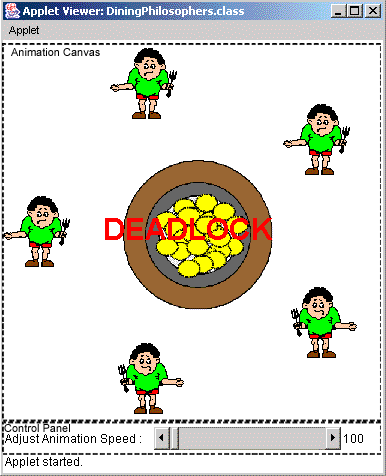Would you like to make this site your homepage? It's fast and easy...
Yes, Please make this my home page!
Concurrent Programming with Java
Lab Manual, Version 1.0, F. Astha Ekadiyanto,
2002.
[Contents] [Next] [Previous]
Challenge Lab: Solving the Deadlock Problem
 |
Once you have managed to compile all the java codes, try to run the Applet.
You could also provide the nphils parameter to alter the
number of philosopher in the applet.
Try to generate a deadlock condition by reducing the Animation Speed
scrollbar down to 0 (usually in the range of 100 ms would do so). In this
case we just simply reduce the thinking
and eating time so that all the philosophers
will be busy accessing the forks. This will occasionally fall into the
deadlock occurance when by chance all of the philosophers are starting
to eat and holds their left and waiting for the right fork to be released
by others.
In many cases, finding out whether our code may lead to deadlock or not
will not be so practical as this one. It is a software bug that is very
difficult to detect.
|
Here is the Challenge Lab. definition:
By now you will be able to detect that the code is not a deadlock free code.
Try to modify the code so that you can avoid the deadlock (mostly you would
just modify the Philosopher Class and/or the Fork Class)!
Hints:
- The reason for deadlock is because all the philosophers should always start
with their left fork before the right one. Should just any one of them behave
differently, deadlock will not be possible (avoid Wait-for
cycle).
- The deadlock is possible because the philosopher will always hold the fork
while waiting for the other fork. If the philosopher is willing to put down
the fork that he is holding while waiting for the other one, deadlock will
also not be possible (avoid Incremental acquisition).
But watch out that starvation may occur!!!
- The deadlock is possible because the philosopher do not have a way to communicate
with others. If only there is a way to inform neighboring philosopher that
they should take turns in using the fork (even if both are hungry, but can
define each other's priority), deadlock can be avoided. (avoid No
pre-emption).
- Of course among other deadlock conditions, Serially
reusable resources cannot be avoided to provide mutual exclusion when
accessing the forks.
This Challenge Lab. is a required Lab Task. You should submit them via
email.
[Contents] [Next] [Previous]
